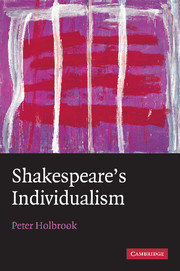Book contents
- Frontmatter
- Contents
- Acknowledgements
- Introduction
- PART I SHAKESPEARE, HAMLET, SELFHOOD
- 1 Hamlet and failure
- 2 ‘A room … at the back of the shop’
- 3 Egyptianism (our fascist future)
- 4 ‘Become who you are!’
- 5 Hamlet and self-love
- 6 ‘To thine own self be true’
- 7 Listening to ghosts
- 8 Shakespeare's self
- PART II SHAKESPEARE AND EVIL
- PART III SHAKESPEARE AND SELF-GOVERNMENT
- Conclusion: Shakespeare's ‘beauteous freedom’
- Index
- References
6 - ‘To thine own self be true’
Published online by Cambridge University Press: 06 July 2010
- Frontmatter
- Contents
- Acknowledgements
- Introduction
- PART I SHAKESPEARE, HAMLET, SELFHOOD
- 1 Hamlet and failure
- 2 ‘A room … at the back of the shop’
- 3 Egyptianism (our fascist future)
- 4 ‘Become who you are!’
- 5 Hamlet and self-love
- 6 ‘To thine own self be true’
- 7 Listening to ghosts
- 8 Shakespeare's self
- PART II SHAKESPEARE AND EVIL
- PART III SHAKESPEARE AND SELF-GOVERNMENT
- Conclusion: Shakespeare's ‘beauteous freedom’
- Index
- References
Summary
The extent of one's power to forget is the final measure of one's elasticity of spirit. If a man cannot forget he will never amount to much.
Kierkegaard, Either/Or: A Fragment of Life (1843), in A Kierkegaard Anthology, ed. R. Bretall (Princeton, 1973), 27.It was imperative sometimes to know how to disobey the solemn wishes of the dead.
Joseph Conrad, Nostromo: A Tale of the Seaboard (1904), ed. K. Carabine (Oxford, 1984), 66.Polonius utters the famous words. They sound oddly in the mouth of the crafty Renaissance courtier, a boring, domineering father who dismisses Ophelia's love-choice as girlish nonsense. The advice is dispensed to Laertes, who is departing for Paris (‘these few precepts in thy memory/Look thou character’ (I.iii.58–9)). The word ‘memory’, along with the whole notion of mentally recording or writing down advice or a command, anticipates Hamlet's later resolution to ‘remember’ the ghost. ‘Remember me’ the Ghost exhorts his son (I.v.91). ‘Remember thee!’ vows Hamlet,
Ay, thou poor ghost, whiles memory holds a seat
In this distracted globe. Remember thee!
Yea, from the table of my memory
I'll wipe away all trivial fond records,
All saws of books, all forms, all pressures past
That youth and observation copied there,
And thy commandment all alone shall live
Within the book and volume of my brain,
Unmix'd with baser matter.
(I.v.95–104)Hamlet will ‘character’ in the notebook of his brain the Ghost's command, erase all else – any trivial material – already written down there.
- Type
- Chapter
- Information
- Shakespeare's Individualism , pp. 78 - 87Publisher: Cambridge University PressPrint publication year: 2010



